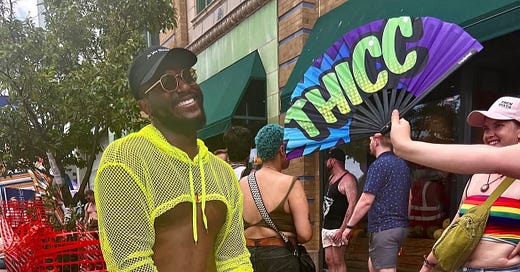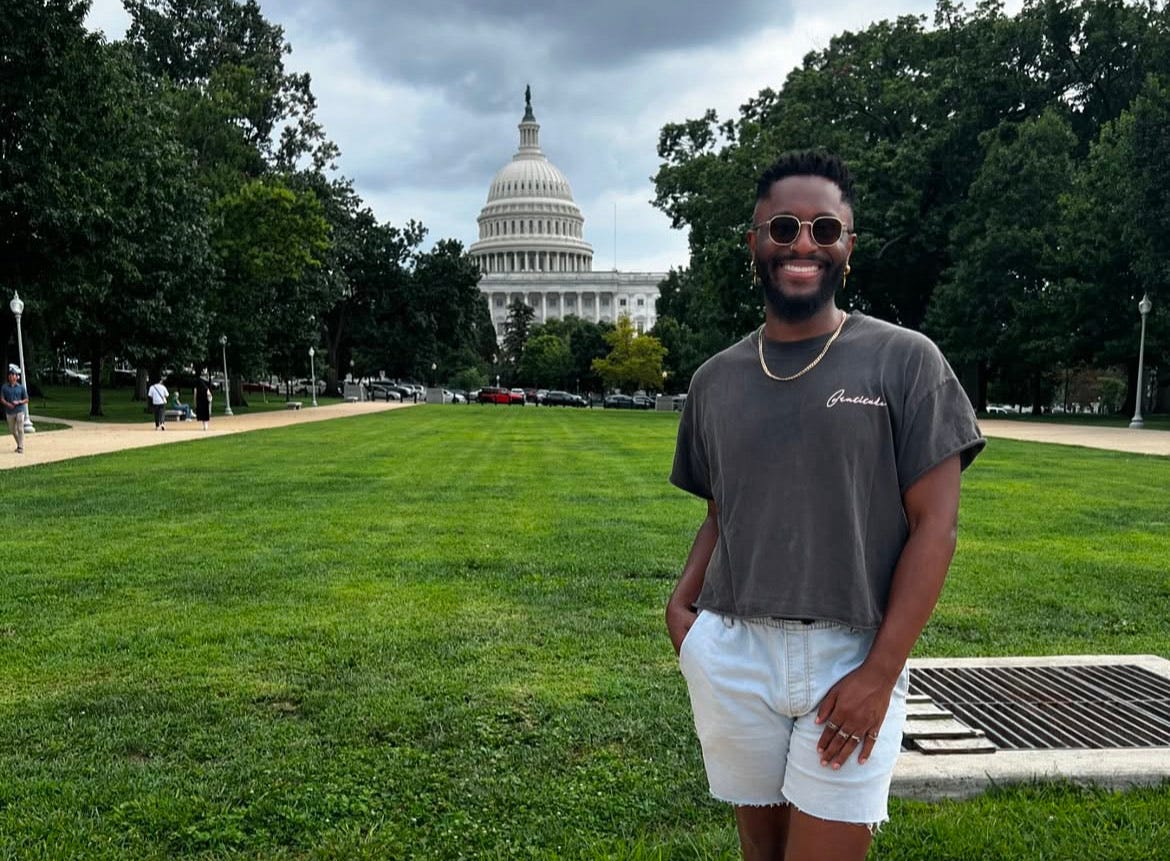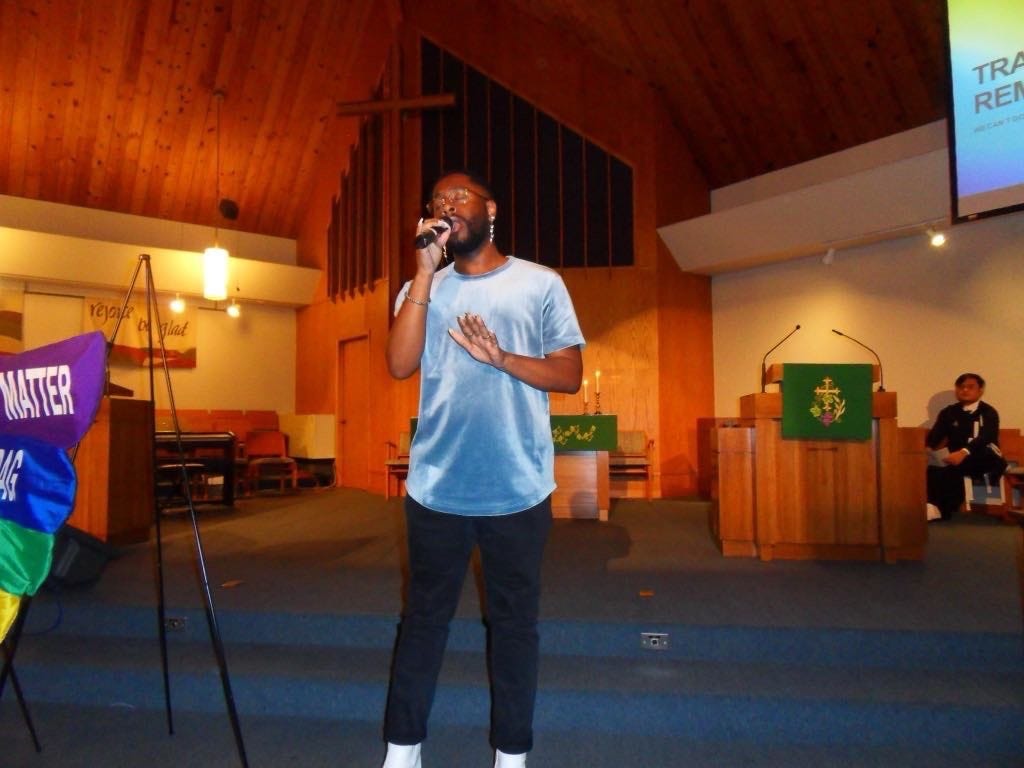from pastor’s kid to pride headliner: on radiating self-acceptance.
I spoke with musician Myles Barnes ahead of his performance at Aurora’s Pride at the Plaza.
Queering the Burbs is a distillation of pop culture, politics and queerness published twice weekly by Joe Erbentraut. If you like what you see, please consider subscribing (many posts are free!), liking or sharing this piece, checking out Joe’s new zine, or buying Joe a coffee.
The heartbeat of Pride is the music. It’s hard to imagine a Pride Parade without the pulsating beat of Robyn’s “Dancing on My Own” vibrating through the air. And if you’re inviting me to a Pride party, you’d better be playing Cher’s “Believe,” Robin S.’s “Show Me Love,” and some Sylvester and Sister Sledge. It’s a matter of honoring our ancestors, babes!
Our community’s Pride anthems also form a through line from our experiences of coming to terms with our identity through the music we listen to in quiet moments behind closed doors to the thrill of experiencing those same songs in community with other people who can relate to that neverending journey. These anthems, which helped us begin to understand who we were, transform during the Pride season into a rallying cry for everything we are, everyone who came before, and the generations to follow. In so many ways, they are our community’s sacred psalms.
All of this is something Myles Barnes knows well. The 26-year-old Aurora resident says he’s been “singing since he could talk” and first got his start with music singing in church. He went on to sing in gospel groups and choirs. When he came out as gay almost three years ago, suddenly he found himself disconnected from the church and community where he’d planted his musical roots. He thought he was done sharing and developing his musical gifts for good.
It wasn’t until he formed new connections within Aurora’s queer community that he returned to music. At last year’s Pride at the Plaza in downtown Aurora, Barnes sang live for the first time since leaving his church. This Saturday, he’ll be back on the Pride at the Plaza stage. A year later, he’s still exploring his passion for music, writing songs and plotting his next performances.
Music has helped Barnes pursue a path of empowerment and self-acceptance—and he hopes to conjure those same feelings in the hearts of those who watch him perform. I recently spoke with Barnes about his upcoming performance at Pride at the Plaza. Our conversation has been edited and condensed for clarity.
Did you grow up in this area? How was your experience?
I grew up in Aurora, Illinois, and I am the youngest of two in my family. My parents were hardworking people that were devoted to their church they were lay ministers at. Our lives revolved around school, work, and church. Being a pastor’s kid comes with its own kind of spotlight, but being a queer pastor’s kid? That’s a whole other story.
My childhood was full of love: family vacations, stability, laughter. But it was also a childhood where I felt being different was my norm. I attended predominantly white schools growing up and by middle school, I realized my sexuality could make me stand out even more—just not in ways I could talk about. At a young age I had to navigate living in survival mode. Looking back, there’s a version of adolescence I’ll never know—one where I could’ve explored my identity without fear, where “coming out” wasn’t a risk but a revelation.
But here’s the truth: the same community that taught me to hide also gave me resilience. The same faith that once felt like a cage now reminds me I was never meant to live small. And the kid who learned to silence himself? He’s now stepping onto the stage, microphone in hand, ready to rewrite the script.
Sorry for coming right out of the gate with “How was your childhood?” Yikes. But that’s a hell of a lot to navigate: being a pastor’s kid and being queer, being Black and going to a predominantly white school. Tell me more about how you dealt with all of it.
Isn’t it funny how religion works? For years, I carried this script in my head: You’re going to hell for something you didn’t choose, for a love you can’t unfeel. And yet—I loved God. Truly. At the time my faith and true self were at war like that—when that happens you don’t question the battlefield and I only thought that way because I was taught that way. I had some really great people show up for me post-college that really helped me make sense of this and it ultimately led me to ponder and now live a life where I end that internal war.
Walking away from that mindset wasn’t just a decision—it was an undoing. A dismantling of everything I’d been taught to call truth. When I came out on my birthday, June 25, 2022, it wasn’t just an announcement. It was a revolution. For the first time, I chose me—not the version of me that made others comfortable, not the one who mastered the art of folding into the background. Just me. Unapologetic and free.
But let’s keep it real: Freedom like that doesn’t come without scars. There were very real hurts and experiences that I’ve really had to work through. There were things I had to grow out of. I spent years making myself small. But what I didn’t realize? Every time I made myself smaller, I was betraying the very essence of who God made me to be. Now? I’m done with boxes.
There’s such an expectation connected to being a pastor’s kid. How did your family respond to your coming out? How is the relationship now?
Our relationship has gotten better. They said some really hurtful things at the jump and for a time period after that. I kind of just went no contact with them just because of how hurtful things were. I had moved out and I had this whole new life in front of me, so I wanted to leave that behind. Luckily though, we did reconnect after that time period, and we had a chance to talk and actually work to move forward.
Things aren't perfect. I don't think they'll ever really agree that being gay isn't something that's a morality issue and I've accepted that. I'm OK with that. I've learned that I don't need their approval nor their love on this matter. I just need myself for that. But it's still a struggle though sometimes to have to commit to thinking, OK, I'm not going to be resentful. I'm going to be loving. I'm not going to be spiteful. I'm going to make sure that I treat them how I want to be treated. And there are other loving parts of our parent-son relationship that work. They've been there for me when I've needed them for some significant things that have happened this year. So things are getting better. I hope for even better things to come for us, but I appreciate what we have now.
I know music was also a big part of your church experience and your religious background. Did your beginning with singing happen in the church? When did music enter into the picture for you?
In college, I had come to have the passion to be a worship pastor. I went to a Christian denomination school and I had a lot of opportunities to grow in that. I was leading worship at a church in Aurora and I was very involved. Once I came out and was divorced from that, in an effort to find new community and new friends, I stumbled across Aurora Pride and the group Peers Respecting Individuality, Sexuality and Mentality (PRISM), a group that meets on Thursdays. I literally got invited to do my first show ever because I was just play-singing in our little hangouts and other people were like, “You're really good. Do you want to do something with that?”
I was convinced that when I came out, I was just going to be done with singing on stage. I was going to hang up the microphone, if you will, and just never sing again. But out of that, they invited me to sing at Pride at the Plaza last year. That was the first time performing in front of people since I left the church. From there, other opportunities came. I got the chance to perform at Joliet Pride last year because of that event. That was the genesis for where I feel like I'm going musically.
How did it feel to have your first time performing in front of other people since leaving the church happen at such a high-visibility, high-profile Pride event? I mean, the mayor’s there and there’s a lot going on.
It was scary and I honestly went in with my best at the time. I did it scared and I processed the journey a lot with good community because I can be an overthinker sometimes and get so in my head. My community really offered me listening ear when I needed it and they kept encouraging me to stay the course because you never know what's going to come.
What song did you perform last year and why did you choose it?
It's called “Standards” by Leslie Odom Jr. and it’s basically a song that talks about holding to your standards. And for me at the time I was really hungry to have accepting people in my life. When I came out, I put a real distance between my former community and it was a real journey to try to find community and friendship again. Singing that song was declaring that these are my standards for the people that I have in my life going forward and for myself. And I’m gonna own that fiercely.
I’m sorry that you lost those friends. Clearly those friends didn’t deserve your friendship if that was the dealbreaker for them. Are you willing to share what you have planned for this year’s performance at Pride on the Plaza? This is the first Pride under this Trump administration. Are you feeling different heading into the festivities this year with everything going on, or are you feeling ready to go and just Pride it up?
I'm definitely ready to Pride it up. Crop tops, booty shorts, bracelets, I'm ready. I think now more than ever, it's important for us to have Pride and to be active in Pride because it's times like these where they want you to fear and they want you to not want to gather. They want you to not organize, and they want you to grow careless and tired. And I'm trying to make it a point this Pride Month to not give into that.
I think Pride begins and saves lives. That's what it did for me and for many people I know. As far as my performance goes, I will be singing three songs at Aurora’s Pride at the Plaza. I'll be opening with “This Is Me” from The Greatest Showman, and then I'll be doing two numbers at the end of the entire show. One of them will be an original, so I won't be revealing too much about that. And the other one will be a cover of one of my favorite songs.
My assignment on that day is to empower people to be themselves, to empower them to love on themselves, to empower them to know that there's no part of them that's a mistake or an accident, that they deserve to be here just as much as anybody else. I want to bring that in song, and I want to communicate that in energy.
“This Is Me” is such a perfect song for Pride. Do you have any other particular favorite songs you find yourself turning to during the Pride season?
There’s the classics “Born This Way” by Gaga and “I’m Coming Out” by Diana Ross, and literally any Shea Coulee music. I love Shea Coulee—she’s my favorite drag queen. I’m also finding a lot of encouragement in “No More Hiding” by SZA, “Black Mona Lisa” by Billy Porter and “Vogue” by Madonna.
I adore Shea too! Our iconic Chicago queen. Her music is genuinely so good too. Besides listening to some of Shea’s music (ha), how are you going about stepping into your queer joy? How do you tap into that energy to show up and show out for the community when there's so many forces that are nudging us toward being a bit quieter this year for Pride?
For me, it's perspective. I have to put everything in perspective, otherwise I’m literally going to go crazy. So that looks like, OK, I can't read every single CNN news article that comes up on my feed. I can't read every Facebook post. I have to take this in moderation and stride because if I'm giving more than I'm getting back, I'm going to fail. And then out of that, I’m just taking breaks and balancing that with fun things. I love a good podcast. I love Drag Race. I love audio books, hanging out with friends, touching grass and getting myself grounded. The stuff we’re going through is so ungrounding. I sometimes turn to prayer as well. I'm not a Christian by any means, but I do believe that there is some type of power out there and that they hear me and that they love me.
I’ve also just realized that I'm one of many queer people, so what you can do may not be necessarily what I can do, but you're able to do it because you have that skillset and talent. You're able to write this newsletter. I'm able to do that with my voice. There's so many ways for all of us to protest or actively work against what's going on. It doesn't have to just look like being in the streets. The possibilities are endless.
You’re so right — the doom scrolling at a certain point simply isn’t helping anyone. Is there anything else on your mind heading into this performance and Pride Month?
I'm actually nonbinary, and this is a recent discovery of myself. It’s been a whole process stepping into this but I’m glad I did. This Pride, I’m celebrating that—for myself, and for anyone still waiting for their moment to exhale. This Pride Month I’m trying to take every chance to practice greater self-love and self-acceptance. I want to continue to be fierce and hold my head high no matter what anyone may say.
As for the performance, excited doesn’t begin to describe how I feel—it’s still so surreal. I’m really grateful to have been invited back by the Aurora LGBTQ Advisory Board this year and I hope the good energy and love is felt from my performance and that people will want to see more.
For more words from queer folks out here doing the work in the western ‘burbs and beyond, read my previous interviews with Batavia artist Annie Hex, Aurora organizer Javi, the organizers of Geneva Pride, Paramount Theatre artistic director Jim Corti, Aurora trans activist Penelope Torres, North Aurora musician Katie Bogle, Hoof & Horn co-owners Jarrod Johnson and Adrian Xavier Frost, Batavia activist Scott Naylor, Youth Outlook’s Carolyn Wahlskog, Ramshackle Farm’s Shannon and Eve Mingalone, Batavia’s Lyndsay Hartman, Aurora activist Fred Yanos, On Point Nails’ Hailey Conran, Batavia’s Martin Beirne, Naperville’s Beverly Trafton, and Batavia’s Rhiannon Hammer.
Posts like these are accessible to all readers thanks to the support of Queering the Burbs readers. Beyond upgrading to a paid subscription, some other ways to support this newsletter and its mission include: Tipping a cup of coffee via Ko-fi.com, commenting on or liking this post below, or sharing this post with friends.
SONG OF THE RIGHT-NOW
Every Pride season, I find myself thinking back to the victims of the horrific Pulse Nightclub shooting in Orlando in 2015. That night, 49 people were killed and 53 others were wounded in the deadliest terror attack on U.S. soil since 9/11. And it all happened on Latin night in a gay club.
There have been many musical tributes to the Pulse Nightclub victims, but none of them stir me deeper than the Hercules & Love Affair remix of Sharon Van Etten’s song “Not Myself.” It brings me to tears every time I hear it as I’m transported to a dark dreamy dance floor, dancing through tears thinking of the lives we’ve lost and dreaming of who we might yet become while ultimately just melting in the moment and the beat. Melting into everything it means to be queer in this country today.
I know it's too much to take
There's too much at stake
But I want you to be yourself around me








As someone with family in the church... this really resonated. I really admire Myles' commitment to love and not being resentful. Accepting that family might never truly accept you but also still maintaining a loving relationship with them is a struggle. Thank you both for this article!
Good article nephew. Change is hard for everyone, but family is family and in times of need, we go nowhere. Just understand even though all might not agree, when it counts or when in an emergency the love and protection is there. Love you Nephew.